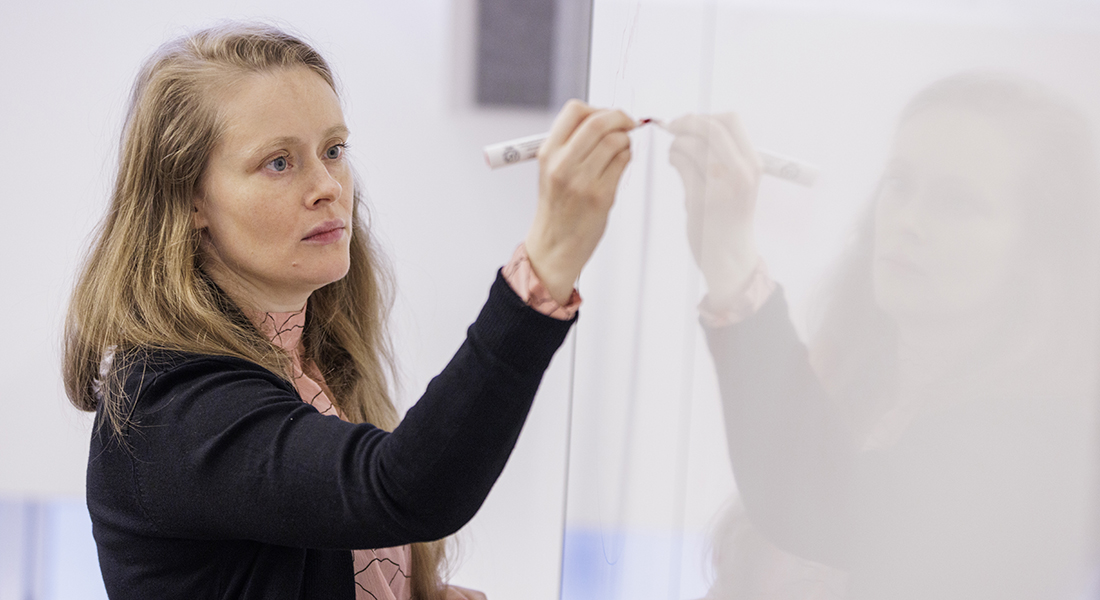Vacant Positions

In the QMATH centre, we are continuously looking for PhD students and postdocs. Potential topics include Mathematical Physics, Quantum Information, Quantum Computing and Quantum Simulation.
QMATH hires via departmental calls with annual deadlines in fall (postdoc and PhD) and spring (PhD only). Potential PhD students can only apply through these two calls, but are encouraged to contact faculty members at any time about potential projects. If you are interested in a postdoc position but the fall deadline has passed, feel free to contact potential supervisors to discuss other possibilities.
If you are located in Copenhagen, you are welcome to come by our weekly Wednesday QLunch seminar to get an impression of the group and of the research that we conduct at the centre.
UCPH is a very family-friendly employer, and at QMATH we are committed to supporting women and diversity in science. Therefore, we particularly welcome applications from women and other underrepresented groups.
Current Calls
Applications for PhD or postdoc positions go through the general call of the Department of Mathematical Sciences. There you can indicate a potential supervisor at QMATH, or a general preference for working at QMATH.
You can find current job openings at the Department of Mathematics here: https://www.math.ku.dk/english/about/jobs/
The deadline for the next PhD call is November 15, 2025.
PhD stipends in Mathematics at the Department of Mathematical Sciences
The deadline for the next postdoc call is November 15, 2025.
Postdoctoral Positions in Mathematics at the Department of Mathematical Sciences
Note that postdoc applicants should apply both through the university portal and via MATH Jobs.
Projects and Supervisors
PhD stipends and postdoc positions are available for working on the following projects:
-
“The Mathematics of Quantum Theory” VILLUM Fonden Centre grant with projects on different aspects of quantum information and mathematical physics (contact Jan Philip Solovej or Matthias Christandl)
-
“Quantum for Life - Quantum Computing for the Life Sciences” Centre grant funded by the Novo Nordisk Foundation (contact Matthias Christandl for further details)
- “Resource Q” project funded by the European Research Council (ERC Consolidator Grant) with focus on quantum communication, tensor and tensor networks (contact Matthias Christandl for further details)
- "Mathematics of Bose-Einstein Condensation” project funded by the European Research Council (ERC Advanced Grant) with focus on the mathematical physics of many-particle systems (contact Søren Fournais for further details)
- "Trustworthy Quantum Technologies" funded by VILLUM Fonden (contact Laura Mančinska for further details)
-
"Applying quantum devices to many-body physics," a research group funded by Novo Nordisk Fonden aimed at using quantum devices to gain a better understanding of many-body physics in and outside of equilibrium.
See https://danielmalz.com/join-us/ for details or contact Daniel Malz directly. -
"Exotic Phases in Interacting Quantum Many-Body Systems: Disorder and Topological Characterization" funded by VILLUM Fonden (contact Albert Werner for further details)
Postdoctoral Positions
The QMATH Centre
PhD Stipends
The standard PhD programme in Copenhagen is a 3-year programme, with entering PhD students expected to hold the equivalent of a master's degree.
Students who have not completed the equivalent of a Danish master's
Working Environment
University of Copenhagen is a highly ranked university with over 35000 students. The Department of Mathematical Sciences is internationally recognised in both pure and applied mathematical research.
The faculty of science hosts an extensive quantum computing effort, including the Novo Nordisk Quantum Computing Programme. QMATH interacts with this efforts through the UCPH Quantum Hub, which promotes interdisciplinary collaboration within Quantum Science at the University of Copenhagen.
As a city, Copenhagen frequently tops rankings of the most liveable cities in the world. The University of Copenhagen offers good working conditions and a collaborative work culture and is a family-friendly employer.
Scientific and Social Activities
The QMATH centre has an inclusive and diverse working environment and offers a number of scientific and social activities, such as weekly Quantum Lunch seminars, group meetings, reading clubs and two annual Masterclasses.
Once a year, the QMATH members organize a group outing with a scientific as well as a social program. QMATH has a running club, and and its members are very active and fast runners at the annual DHL Race. The QMATH employees have free access to a fitness room in Vibenshuset, where our office area is located.
By the end of the year, the QMATH members organize a Christmas lunch where everyone brings a dish to share.
 |
